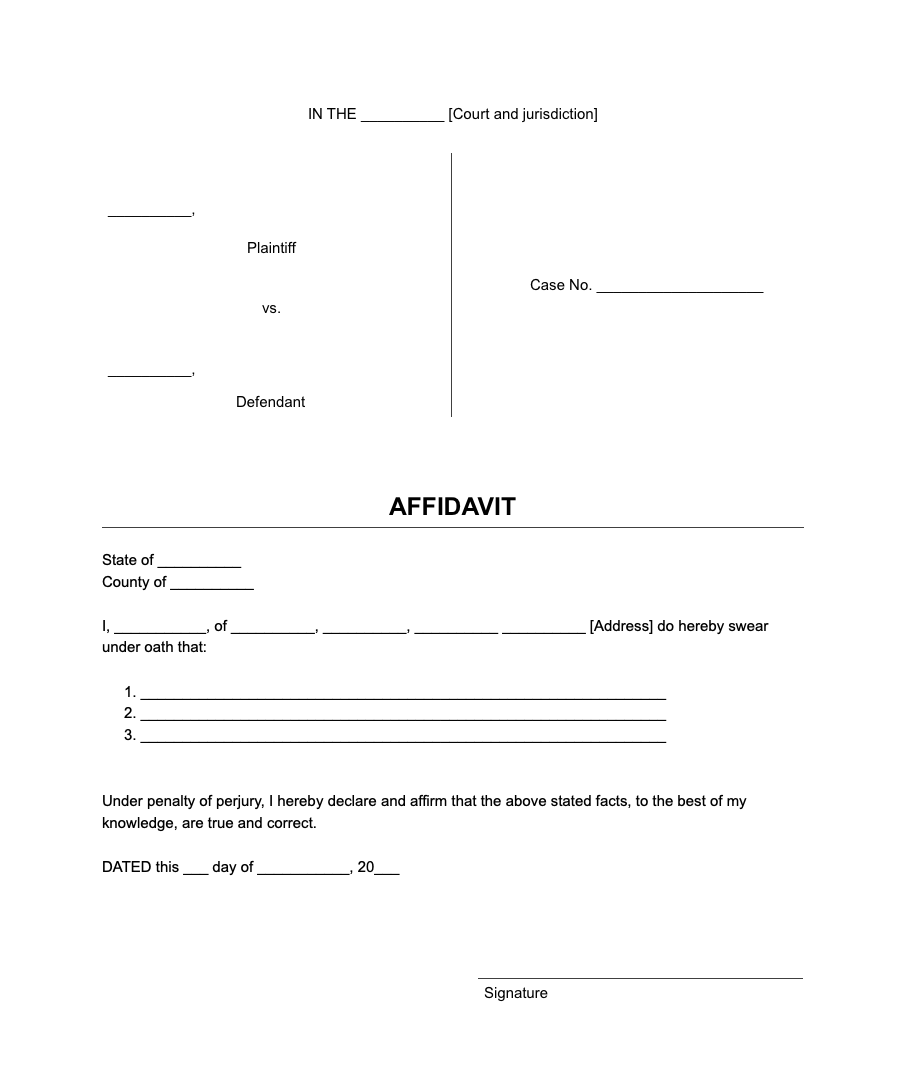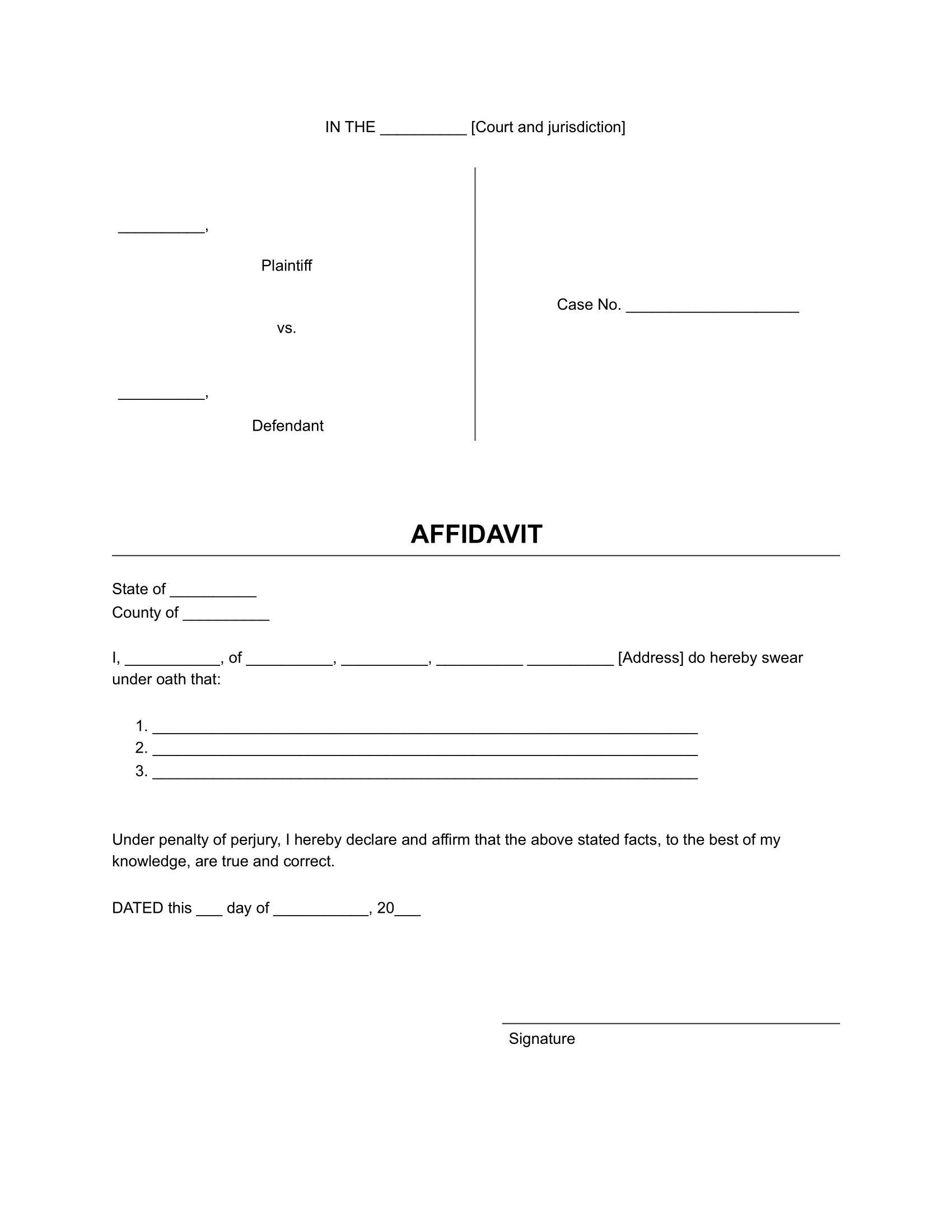-
1
Choose a form
Browse and select the document you need
-
2
Answer Questions
Go through our builder and complete your form in 5 minutes
-
3
Download & E-sign
Receive your document in PDF or Word format
 Create Document
Create Document
- Download as PDF and Word
- Access from desktop, tablet & mobile
- E-signature
- Yearly Updates & Notifications
An affidavit is a written sworn statement. They are used as evidence in court in place of oral testimony or to support another person’s statement or evidence. Affidavits are helpful whenever a sworn testimony or legal record is required.
You can use an affidavit for various purposes, from clearing up identity theft concerns to determining custody and visitation rights in divorce cases.
What Is an Affidavit?
An affidavit is a legal document that contains someone’s sworn statement about something they saw or did. For an affidavit to be admitted as a legal document, the person making it, the affiant, must swear or attest under oath that what they are saying is true, under penalty of perjury. Affidavits are made before an authorized magistrate or officer.
Why Do You Need an Affidavit?
Affidavits are used whenever someone needs to present evidence of something or provide support for another person’s statements. Affidavits can also be used to verify that something was done correctly. For example, a records clerk attaches an affidavit to a record request to show that the request was correctly made.
An affidavit might be needed for:
- Proof of domicile. Domicile is a legal term for residence. Proof of residence can be required for probating a will, insurance purposes, and benefits transfers.
- Proof of service. If you ever serve legal documents, such as for divorce or small claims, you will need to attach an affidavit of service to show the documents were delivered and received.
- Identity theft. Should your identity be stolen, credit agencies will clear your credit on receipt of your affidavit that this occurred.
Affidavits are also used when testimony is needed in court, but the affiant cannot appear. For instance, if the person is too ill, out of the country, or has since died, their written statement can be entered into the record.
When Do You Use an Affidavit?
An affidavit can be used almost any time sworn testimony is needed. They can be helpful in family law and small claims cases when oral testimony is unnecessary.
For instance, in a child custody case, affidavits from family members can help establish the best visitation schedule without bringing all the relatives into court.
Affidavits serve as valuable corroborative evidence for various events and routine activities. They are frequently employed to confirm timely completion or adherence to schedules.
For instance, clerks and others who handle documents will provide affidavits stating they are the ones who assemble the information when they send it to the requesting party.
What to Include in an Affidavit
You do not need to go to an attorney to write an affidavit. You can find free affidavit forms online or even write them out yourself. It should contain the following information to make it legal:
- Your name and identifying information
- A statement that you understand you are making this affidavit under penalty of perjury and that you are making it voluntarily
- The facts you are attesting (Do not include opinions, inferences, or suppositions.)
- Your signature and date
The affidavit should be written plainly and clearly. Avoid any legalese or jargon. Do not lie, and do not leave anything out. If you are not sure about anything, consult an attorney.
Frequently Asked Questions
What Happens if I Lie in an Affidavit?
An affidavit is a sworn legal document. Although this is rare, you can be charged with perjury for lying on an affidavit. More likely, your testimony will be stricken, a legal term meaning your testimony is considered unreliable and worthless.
Do Affidavits Need to Be Notarized?
Yes, an affidavit must undergo notarization in accordance with the laws of your state. The presence of a notary public is essential to validate your signature, confirm your identity as the affiant, and ensure that you signed the affidavit voluntarily, without any form of coercion.
How to Write an Affidavit
You can find free affidavit templates for general purposes and forms for many specific types of affidavits online. These templates are helpful because they have everything laid out in order. You might want to use these if you need an affidavit of domicile, marriage, or another specific affidavit.
Court Information
You must include the court name, jurisdiction, party names, and case number if this is a court case.
Personal Information
Your name, address, and contact information.
Statement
Each fact should be separate and numbered. Try to write in chronological order. Write from your perspective, using the first person pronoun, I. Do not use phrases like “this writer” or “your affiant” — that is for police reports.
Signature and Date
The date is the date you wrote the affidavit, not the date it was notarized.
Notary Public Certification
You can use the services of a notary at your local bank. Sometimes shipping offices also have notaries.
